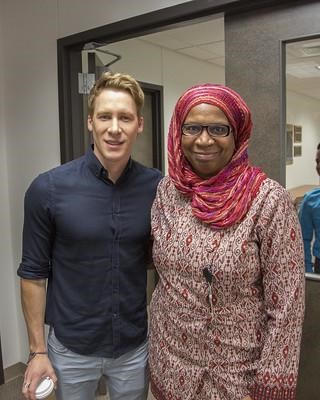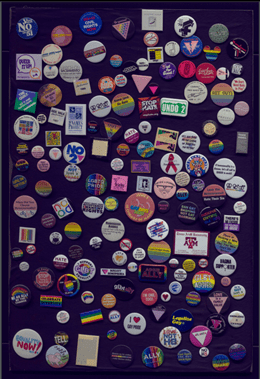Archival Innovators: Rebecca Hankins on the Rich LGTBQ+ Collections Housed in Cushing Memorial Library and Archives at Texas A & M University.

This is the latest post in our series Archival Innovators, which aims to raise awareness of individuals, institutions, and collaborations that are helping to boldly chart the future of the archives profession and set new precedents for the role of archivists in society.
In this installment, Kristianna Chanda interviewed Rebecca Hankins. Rebecca L. Hankins, FSAA, is the Africana Resources Librarian/Curator at the Cushing Library, Texas A&M University, where her portfolio also includes women’s and gender studies. In this interview, Rebecca reveals the Cushing Library’s extensive LGBTQ+ holdings and her role in working with the LGBTQ+ community to help them preserve their heritage.
KC: Please describe your collection. What are some highlights/interesting features to your collection?
RH: I think the collection is much more diverse than many collections that deal with LGBTQ communities. They are often white collections documenting people most visible in the media and the press. I try to include individuals who are often in the background. Even in the background, they make such an impact on communities.
Our larger collections include the Don Kelly collection and the Judge Phyllis Frye papers. Phyllis Frye, a former Texas A&M student, is the first appointed judge in the city of Houston. She was appointed by the first openly gay mayor of Houston, Annise Parker. Her collection is so rich because one of the unique things I like about Phyllis is that she was always open, honest, and presented herself as “this is who I am.” She married right after graduating A & M, then served in the military as a man. She always felt something was not right. So when she came out as transgender her wife stayed with her and was her biggest cheerleader and supporter. Phyllis was unapologetic, she was in your face, and her collection is the most used of our holdings.
We also preserve the collection of Don Kelly, who still lives in Houston. I have been an archivist for over thirty years and have dealt with a wide range of people, both researchers and celebrities. Don is one of the top, number one kindest, most generous donors that you can ever meet. He was a civil servant for years in Galveston and always lived as a gay man. He collected his entire life and went into overdrive after he retired. He sent out a message to the archives listserv discussing how he would like to donate and sell part of his collection to a repository because it was just getting too large for him. I talked to my colleagues and director at the time and they thought acquiring his collection was a great idea.
I brought in a number of subject faculty in film studies, sociology, history, and other disciplines and told them we need to get this collection! At that time, it may have been 6,000 items. Now it is almost 30,000 items and he continues to add to it. It is one of our largest collections by a single donor.
The thing about the collection that is really great is that it started out with a majority white male focus. However, through discussing with Don the interests of researchers, he will seek and donate materials in those areas. So he’s built a huge collection that, through his efforts, continues to grow and evolve and become more and more inclusive.
Other collections include the papers of Arden Eversmeyer, who started the Old Lesbian Oral History Project that documents lesbians over the ages of 50 or 60; the papers of Professor Harriette Andreadis, who was head of the Women and Gender Studies program at A & M; and documents pertaining to a lawsuit demanding that Texas A&M provide services to LGBTQ students. Students involved in the case received death threats and were treated terribly but would not back down. I tell students that you must understand that sometimes, if you ask nicely they will say yes, but the majority of times they won’t. What are you willing to put on the line for what you believe in? If it is a just cause, you will see some changes.
KC: What inspired you to work with this collection?
RH I’ve been doing this ever since I started my career at the Amistad Research Center at Tulane University in New Orleans. The Amistad case itself was put before the Supreme Court by the American Missionary Association, which evolved into the United Church for Homeland Ministries. It always supported and advocated for minority communities, including LGBTQ+ communities. So when the Amistad Research Center was founded, documenting the LGBTQ+ community was one collecting focus. Part of my job at Amistad was to connect with the LGBTQ+ community and encourage them to save their materials. When I moved to the University Arizona, I continued that work, and did so again when I moved to the Cushing Library. I am definitely an advocate for community archives and for people archiving their own history to ensure it is preserved. That’s why I do it: it is important that we all have our history documented.
KC: When working with this collection, what worked? What didn’t work? Were you surprised by the outcome or any part of your experience?
RH: Because I am not a part of the community, it’s understandable that people might be suspicious. Have we been the best of allies? Have we been concerned? Is this a part of our history? I understand that it may take time for people to see me as an ally. I am willing to be patient and prove myself. That’s fine, I don’t have a problem with that. I understand being an archivist doing this work gives me a certain privilege. I have to acknowledge that and say “okay, I’m going to let you lead on this. I am going to let this be from your point of view. You tell me. We’ll see how that works.” I think that is important. It’s not my point of view that is important, mine is the least important.
You must be an ally, and you must understand that as an archivist, you are approaching this from a position of power, and you must be ready to remove your own power and pass it to the people you are trying to document.
KC: What would you do differently?
RH: I don’t think I would do things differently. I wish I had more money. Don Kelly has the most expertise when it comes to acquiring gay materials, so I give him part of my acquisitions budget to work with. I wish I could do that with all of my people.
KC: What tips do you have for archivists who want to promote inclusivity through their collections?
RH: Do it. If you want to do it, do it. Sometimes it is just about being brave. It shouldn’t be a matter about being brave. It should be about this is the right thing to do but sometimes in situations you just have to be brave enough to say this is where I am planting my flag.
I think more than anything, archivists need to be more forceful and brave in the work that we do. You won’t get accolades and you may get pushback but do the things that are important to you. I am going to do the work that I enjoy doing because I have to live with myself. So do it. Do what you think is the right thing. Most of the time it will work out and sometimes it won’t, but you will feel better about yourself.
KC: Did you get media attention? How did that happen?

RH: I understand the importance of publicity. I give presentations, I talk about my collections, I publish, and I try to get the message out any way I can. Last year something extraordinary happened when the Journal of African American History profiled my collections. I was like “Where did that come from?” The College of Liberal Arts did a profile on the Don Kelly collection, which was wonderful, and we also have a Don Kelly Fellowship. It’s about letting people know how amazing these collections are for research, learning, and education.
KC: Do you have collaborators? If so, how did you find them?
RH: Michael Jackson, an A&M cataloger, was my biggest collaborator. My good friend Dr. Miguel Juarez has written about our holdings. Dr. Francesca Marini is our outreach person and she and I have talked about the collection across the country. Francesca and I are partnering with the University of Houston on an LGBTQ exhibit.
KC: Did you have institutional, administrative, or financial support for your project? How did you go about securing that support?
RH: Yes we do. The College of Liberal Arts partners with us on the Don Kelly Fellowship. We have also started an endowment for the LGBTQ materials because we need to hire someone paid through this endowment to work with the collections.
KC: What’s next? Either for this project or a new development?
RH: We still have the Fellowship, but because of Covid we had to push it back. The 2020 Fellow will hopefully become the 2021 Fellow. Also, raising the funding for the endowment will be a priority.
KC: What barriers or challenges did you face?
RH: Most important is making people understand that I am an ally. I am here to let you take the lead.
